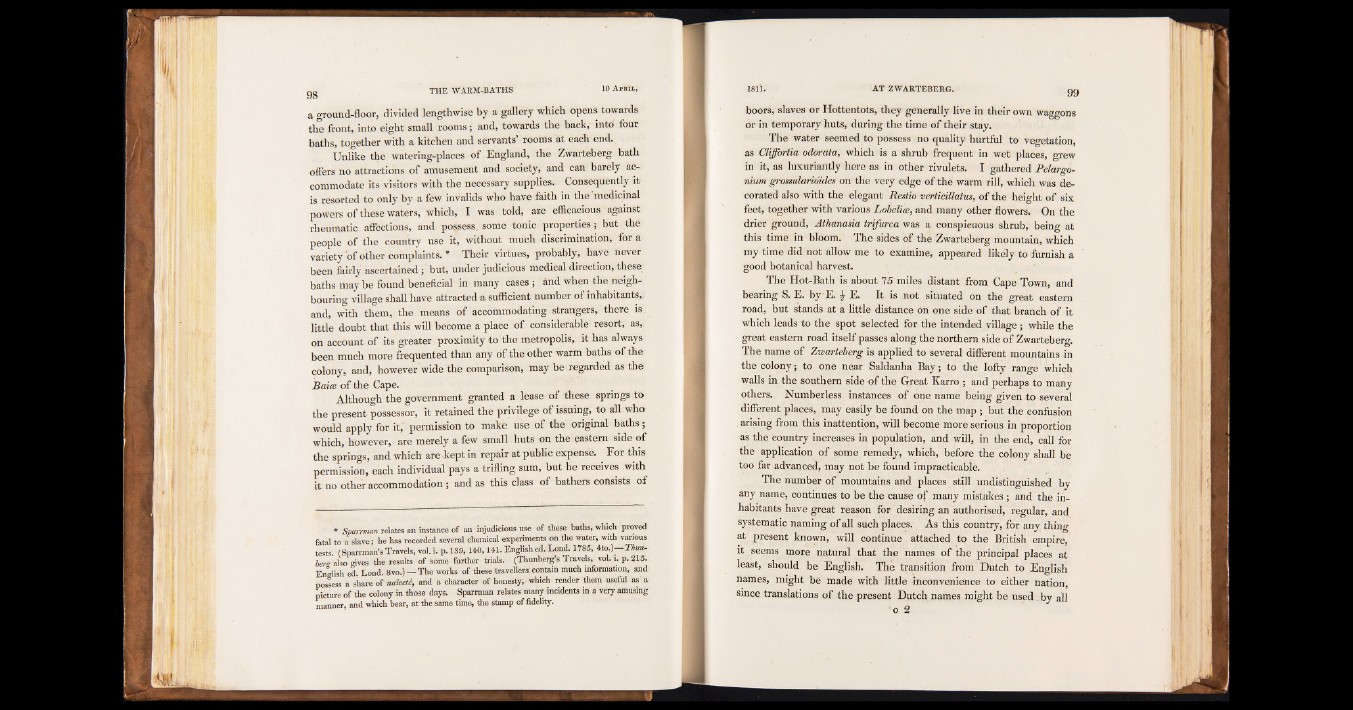
a ground-floor, divided lengthwise by a gallery which opens towards
the front, into eight small rooms; and, towards the back, into four
baths, together with a kitchen and servants rooms at each end.
Unlike the watering-places of England, the Zwarteberg bath
offers no attractions of amusement and society, and can barely accommodate
its visitors with the necessary supplies. Consequently it
is resorted to only by a few invalids who have faith in the medicinal
powers of these waters, which, I was toid, aie efficacious against
rheumatic affections, and possess, some tonic properties ; but thé
people of the country use it, without much discrimination, for a
variety of other complaints. * Their virtues, probably, have never
been fairly ascertained ; but, under judicious medical direction, these
baths may be found beneficial in many cases ; and when the neighbouring
village shall have attracted a sufficient number of inhabitants,
and, with them, the means of accommodating strangers, there is
little doubt that this will become a place of considerable resort, as,
on account of its greater proximity to the metropolis, it has always
been much more frequented than any of the other warm baths of the
colony, and, however wide the comparison, may be regarded as the
Baioe of the Cape.
Although the government granted a lease of these springs to
the present possessor, it retained the privilege of issuing, to all who
would apply for it, permission to make use of the original baths ;
which, however, are merely a few small huts on the eastern side of
the springs, and which are kept in repair at public expense. For this
permission, each individual pays a trifling sum, but he receives with
it no other accommodation ; and as this class of bathers consists of
» Smrrman relates an instance of an injudicious use of these baths, which proved
fatal to a slave; he has recorded several chemical experiments on the water, with various
tests. (Sparrman’sTravels, vol. i. p. 1S9,140,141. Englished. Lond. 1785, 4 to .)-T Sw i-
bere also gives the results of Some further trials. (Thunberg’s Travels, vol. i. p. 715.
English ed. Lond. 8vo.) — The works of these travellers, contain much information, and
possess a share o f navoetê, and a character of honesty,, which render them useful as a
picture of the colony in those days. Sparrman relates many incidents in a very amusing
manner, and which bear, at the same time, the stamp of fidelity.
boors, slaves or Hottentots, they generally live in their own waggons
or in temporary huts, during the time of their stay.
The water seemed to possess no quality hurtful to vegetation,
as Cliffortia odorata, which is a shrub frequent in wet places, grew
in it, as luxuriantly here as in other rivulets. I gathered Pelargonium
grossularidides on the very edge of the warm rill, which was decorated
also with the elegant Restio verticillatus, of the height of six
feet, together with various Lobelice, and many other flowers. On the
drier ground, Athanasia trifurca was a conspicuous shrub, being at
this time in bloom. The sides of the Zwarteberg mountain, which
my time did not allow me to examine, appeared likely to furnish a
good botanical harvest.
The Hot-Bath is about 75 miles distant from Cape Town, and
bearing S. E. by-E; ¿ E. It is not situated on the great eastern
road, but stands at a little distance On one side of that branch of it
which leads to the spot selected for the intended village ; while the
great eastern road itself passes along the northern side of Zwarteberg.
The name of Zwarteberg is applied to several different mountains in
the colony; to one near Saldanha Bay; to the lofty range which
walls in the southern side of the Great Karro ; and perhaps to many
others. Numberless instances of one name being given to several
different places, may easily be found on the map ; but the confusion
arising from this inattention, will become more serious in proportion
as the country increases in population, and will, in the end, call for
the application of some remedy, which, before the colony shall be
too far advanced, may not be found impracticable.
The number of mountains and places still undistinguished by
any name, continues to be the cause of many mistakes ; and the inhabitants
have great reason for desiring an authorised, regular, and
systematic naming of all such places. As this country, for any thing
at present known, will continue attached to the British empire,
it seems more natural that the names of the principal places at
least, should be English. The transition from Dutch to English
names, might be made with little inconvenience to either nation
since translations of the present Dutch names might be used by all
•o 2